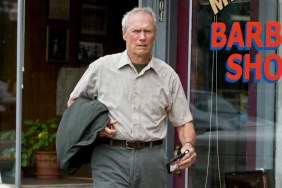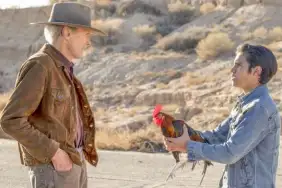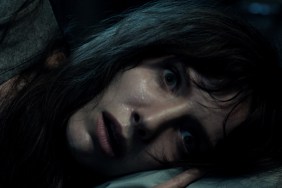Cast:
Clint Eastwood as Walt Kowalski
Christopher Carley as Father Janovich
Bee Vang as Thao Vang Lor
Ahney Her as Sue Lor
Brian Haley as Mitch Kowalski
Geraldine Hughes as Karen Kowalski
Dreama Walker as Ashley Kowalski
Brian Howe as Steve Kowalski
John Carroll Lynch as Barber Martin
William Hill as Tim Kennedy
Brooke Chia Thao as Vu
Chee Thao as Grandma
Choua Kue as Youa
Scott Eastwood as Trey
Xia Soua Chang as Kor Khue
Directed by Clint Eastwood
Summary:
A generally enjoyable but problematic departure for Eastwood which works best during its lighter moments but gets too dark for its own good while trying to create heightened tension and drama.
Story:
Walt Kowalski (Clint Eastwood) is a Korean War vet, living in the Midwest and trying to adjust to the ever-changing neighborhood after the death of his wife, the most bothersome being the Asian immigrants next door who despise him as much as he does them. After Walt helps settle an incident involving Asian gangbangers, Walt starts warming up to the appreciative Asian community especially the two teen kids next door, Thao and Sue (Bee Vang and Ahney Her), but their relationship is one that could never possibly work out in such a setting.
Analysis:
Continuing Clint Eastwood’s attempt at covering every base and genre possible as a filmmaker and actor, “Gran Torino” is different from his other recent movies in that it may be the closest he comes to making an indie film. While much of the movie explores race relations in an eerily similar way as Spike Lee’s “Do the Right Thing,” Eastwood is clearly having more fun with this movie, definitely a positive after making so many serious and grim dramas in a row.
Based on a solid screenplay by Nick Schenk, this simple three-act story introduces Walt as he attends his wife’s funeral, growling and scowling at the young people in attendance. As we learn, this is Walt’s normal demeanor, as he sits on his porch with his dog, drinking beer, smoking cigarettes, and spitting at his new neighbors, Hmong immigrants who emigrated from Asia during the Vietnam War. After a few tense encounters, Walt wins the Asian community over by helping to fend off violent local gangbangers. From there, the movie turns into a delightfully warm and fuzzy fish-out-of-water movie ala “The Visitor” as this crotchety and racist old man starts bonding with his neighbors. Most of the movie deals with Walt’s shaky relationship with Thao (Bee Vang), a quiet and studious boy being strong-armed to join a local gang by stealing Walt’s primo 1972 Gran Torino. This relationship forms the catalyst for the movie’s most enjoyable scenes where Walt tries to mentor Thao and get him out of his shell.
There’s no denying that the movie is better than some of Clint’s other recent movies due to his constant presence as Walt, although it’s sometimes hard to take the more dramatic scenes seriously while he’s growling every line as if “Dirty” Harry Callahan had retired to the suburbs. When he holds some young punks at rifle point and growls “Get off my lawn,” it produces awkward laughs in what should have been a tense situation, and that’s par for the course. You’re not sure whether it’s okay to laugh, especially at the non-stop racial slurs being uttered by Walt throughout the movie. It gets to be too much at times. Even though we all know there are people like Walt out there, one would assume he’d eventually tone it down or that someone would react, but no one even bats an eye as he throws sensitivity to the wind with constant abuse towards his neighbors. When Walt leers at a young Asian cutie while urging Thao to ask her out, it’s downright creepy.
On the flip side of that, Eastwood also brings a deep poignancy to Walt in the way he isn’t able to relate to his own family while bonding with the Asians he claims to hate. Eastwood also does a commendable job being respectful towards showing Hmong traditions, creating a bizarre passive-aggressive relationship with the Asian community around him. He also uses the opportunity to explore some of his recurring religious themes last seen in “Million Dollar Baby” via Walt’s relationship with a young, idealistic Catholic priest played by Christopher Carley, who has promised Walt’s wife to look out for him and finds himself challenged by the cranky oldster. These scenes just aren’t as interesting, maybe because they do feel very similar to his character in the boxing drama.
Most of the cast consists of first-time Asian actors, which certainly makes many of the situations feel more real, though their lack of experience shows, hurting some of the more dramatic scenes. The real breakthrough discovery in the film is Ahney Her as Thao’s cute smart-mouthed sister Sue, who plays the perfect foil to Walt, holding up well against Eastwood in their scenes together. By comparison, the performance by Bee Vang as her brother just doesn’t pass muster, as he plays Thao like a sheepish introvert in a way that just doesn’t stand a chance on screen with Eastwood. Likewise, the inexperienced young actors playing the Asian thugs really bring down the quality of their scenes.
Eventually, the movie gets back to where it began, as the pressure on Thao to join his cousin’s gang turns to gunfire and bloodshed, and the movie turns into a dark revenge thriller. From that point onwards, Eastwood is back in Dirty Harry mode, as Walt goes after the thugs and holds them at gunpoint, even reviving the handgun gesture imagery used more effectively in “Mystic River.” Sadly, it never fully recovers. The last half hour involves a lot of overwrought drama and overacting on everyone’s part, and it gets so ridiculous that any good will built up over the middle third of the movie is essentially destroyed.
While the movie looks better than the average indie thanks to Eastwood’s regular DP Tom Stern, we can certainly be thankful Eastwood didn’t try to score this one himself as he did with “Changeling.” Even so, the unrepentant Eastwood nepotism continues with not one but two Eastwood sons getting work, Kyle as the composer of the score and his other Scott appearing in a scene as Sue’s date. Nothing can possibly prepare you for the end credits when Clint actually sings a song called “Gran Torino”… presumably in character. It’s not the best way to leave a movie that already has you scratching your head over what you’ve just watched.
The Bottom Line:
A decent script and a buoyant performance by Eastwood is often marred by some of the weaker performances around him, and the erratic nature created by the movie’s inability to decide whether it should be funny or meaningful. Ultimately, the movie overstays its welcome and entertaining as it can be at times, it just doesn’t work as a whole.










